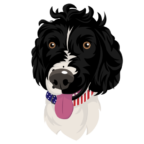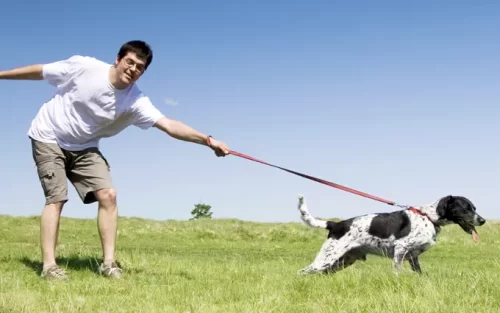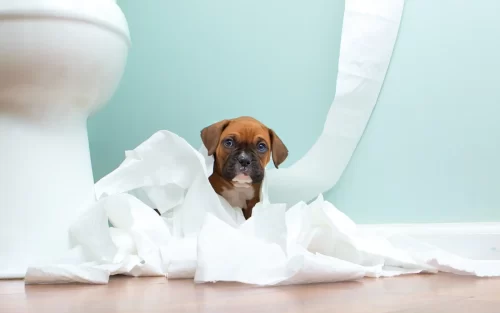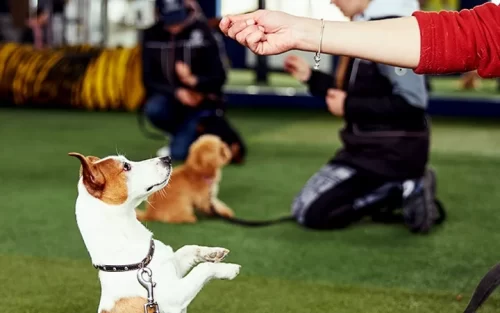Some may find it a tad bit “icky” but the inexplicable and rather unpalatable habit of dogs eating their own or other animals’ stool, a phenomenon known as coprophagia, is a common challenge among dog owners. You may cringe at the very idea but grapple no more, as we provide you with the ultimate guide to break this habit and prevent dog coprophagia.
Understanding Why Dogs Eat Stool
Before delving into the prevention measures, it’s crucial to understand why dogs eat stool. This behavioral oddity can be traced back to their ancestors, the wolves, who would often eat the waste of sick, young, or weak members. While such a behavior seems bizarre in today’s domesticated pooches, other reasons could range from dietary deficiencies to certain health conditions or it could simply be out of sheer boredom!
Dietary Deficiencies
In some cases, pooches may indulge in coprophagia due to a lack of essential nutrients in their diet. When their body craves for necessary nutrients and fail to receive it from their daily meals, dogs turn to alternate sources, unfortunately, feces happens to be one of them.
Health Conditions
Certain health conditions, including diabetes, thyroid disease, and the inability to absorb certain nutrients can also provoke this behavior. As a responsible pet owner, it is vital to pay attention to such abnormal behaviors, as it could be their way of hinting at an underlying health issue and might require immediate veterinary attention.
Boredom or Seeking Attention
Dogs are social creatures. They relish the attention of their humans. Unintentionally, we might be reinforcing their poop-eating habit by way of reacting, albeit negatively. Or it could be their way to eliminate boredom. Engaging your pooch in continuous active play could redirect their attention, thus preventing coprophagia.
Effective Prevention of Dog Coprophagia
Only when you understand the genesis of the issue at hand, can you devise effective strategies to combat it. Armed with the right approach and some patience, you could help your furry friend give up this unsavory habit in no time.
It’s important to understand that your beloved canine companion is not doing this to annoy you, but quite likely because of factors out of their control. With the right interventions and the guidance of an experienced veterinarian, you can successfully prevent dog coprophagia. We dive into some effective measures you can adopt in the following sections.
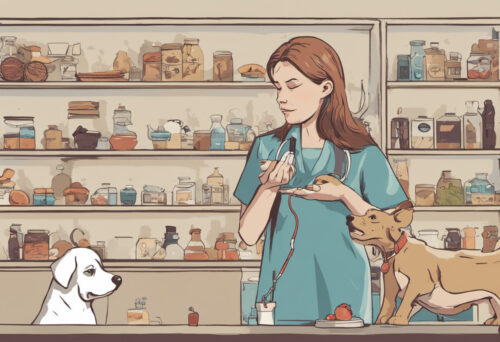
Improving Diet Quality
Ensure your furry friend’s diet is well-balanced, including all the essential nutrients they require. Feeding a deficient diet may prompt your dog to look for missing elements elsewhere, feces being a highly undesirable choice. Various brands offer high-quality dog food packed with the necessary vitamins, minerals, and probiotics aimed at delivering complete nutrition.
Regular Health Check-ups
Regular vet check-ups are essential to detect any underlying health concerns that may lead to coprophagia. An up-to-date health examination can help identify any potential deficiencies or diseases and allows veterinarians to recommend necessary interventions. Always communicate openly with your vet about any abnormal behaviors you’ve noticed.
Avoiding Negative Attention
While catching your dog in the act can be unsettling, how you respond can unknowingly reinforce the undesirable behaviour. Overly dramatic reactions, even negative ones, can be interpreted as attention to your pooch. As much as possible, maintain a neutral composure and calmly discourage them if you catch them during the act. Redirecting their behavior towards a positive action can help eliminate coprophagia over time.
Mental Stimulation and Physical Exercise
Boredom can be another core trigger for dogs to engage in coprophagia. Dogs need constant physical and mental stimulation. A boring environment might trigger unusual behaviors as a way to entertain themselves. Ensure your furry friend has enough exercise and playtime, incorporating exciting toys and stimulating their mind with interactive games.
Consider Using Deterrent Products
If your dog’s coprophagia persists despite your best efforts, consider using a stool deterrent product. These safe, non-toxic products make the stool taste unpleasant to discourage your dog from consuming it. There are many deterrent products available in the market. However, always consult your vet before introducing any new product into your dog’s routine.
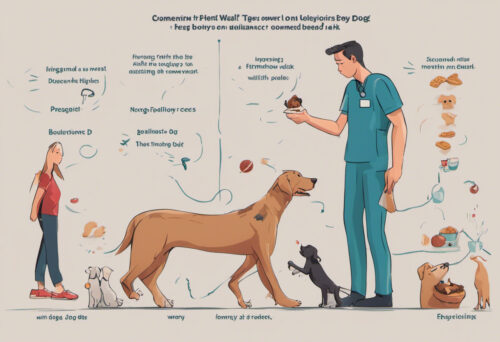
Incorporate Training and Obedience
In addition to dietary changes and medical interventions, incorporating basic training and obedience can significantly help in the prevention of dog coprophagia. Simple commands like “leave it” and “drop it” work extremely well in halting your canine from indulging in this habit. Training resources such as guides from American Kennel Club could be your go-to resource for tips on effective training techniques.
Cleanliness Is Key
Maintaining a clean living space is a surefire method for stopping this undesirable behavior. Promptly clean up after your canine friend to eliminate the temptation entirely. Remember, “out of sight, out of mouth!”. This practice not only helps with coprophagia prevention but also keeps your home pleasant and sanitary. The American Society for the Prevention of Cruelty to Animals (ASPCA) offers excellent advice on proper pet waste disposal.
Final Thoughts on Dog Coprophagia Prevention
While the thought of your dog consuming stool may be quite unsettling, remember that it’s not an uncommon behavior and can be addressed with understanding and appropriate action. Regulating and improving your pet’s diet, routine vet check-ups, avoiding negative attention, sufficient exercise, and introducing deterrent products are all proven methods.
However, be sure to always consult with your veterinarian or a certified animal behaviorist as these professionals can provide more personalized guidance that’s ideal for your dog. Renowned organizations such as the American Veterinary Society of Animal Behavior can help in finding a certified animal behaviorist near you.
As rightly said by Roger Caras, “Dogs are not our whole life, but they make our lives whole” and let’s strive to give them the best life they deserve. Remember, patience, understanding, and love are the best ingredients for a healthy and happy canine!
